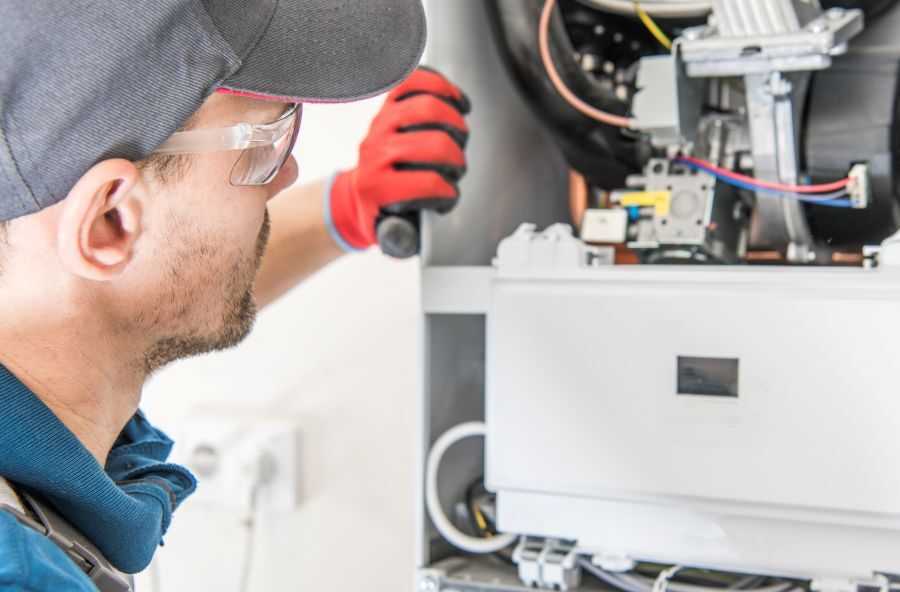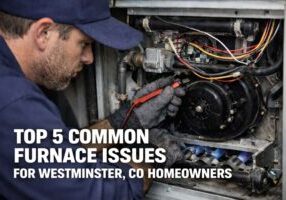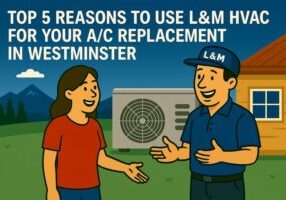As summer heats up, your air conditioner becomes your home’s MVP. But if your A/C isn’t running quite right, or worse, not at all, you’re not alone in wondering what to do next.
At L&M HVAC, we hear the same questions from local Colorado homeowners every season: Should I repair or replace my unit? How can I lower my energy bills? What size unit do I actually need?
Replacing your air conditioner is a big investment, and you don’t want to rush the decision. Before spending thousands on a new unit, ask yourself these seven questions to feel confident and informed.
The 8 Most Common Questions Westminster Homeowners Have About Their Air Conditioning Units
1. What Should I Do Before Turning on My A/C After Winter?
Before running up your system for the first time in spring, you should do some prep work, including:
- Replace your air filter.
- Clear debris around the outdoor unit.
- Make sure the thermostat is set to “cool.”
- Consider scheduling a professional tune-up.
Performing yearly air conditioning maintenance is the proactive approach to helping your system operate efficiently, extending the lifespan of equipment, and preventing costly repairs and breakdowns.
2. What Should I Do When My A/C Unit Is Running, but Not Cooling?
Sometimes your AC can run without actually doing its job. If your system is constantly running but your home never really cools down, or if some rooms are chilly while others feel like a sauna, something's off.
Watch for these five signs your unit isn’t functioning properly:
- Weak airflow or warm air blowing from vents
- Unusual noises or smells
- Frequent cycling on and off
- Water buildup around the unit
- Ice buildup on pipes or ductwork
Before you call in a pro, check these basics:
- Is Your Thermostat Working Properly?
Does it respond when you adjust the settings? Is it accurately reading the temperature in your home? If not, it could be as simple as a dead battery.Tech Tip: If your thermostat runs on batteries, change them once a year to avoid surprise issues. - Is Your Air Filter Clean?
A dirty filter restricts airflow and makes your system work harder. Replace it with a high-quality filter. The better the filter, the less dust, allergens, and particles circulate through your home, affecting indoor air quality.Tech Tip: Filters should be checked every month, especially in homes with pets or family members prone to allergies.
If everything checks out and your system still isn’t cooling properly, don’t wait for a total breakdown. Call a licensed HVAC technician to inspect and diagnose the issue.
3. How Long Should My A/C Unit Last?
Most air conditioning units last between 15 and 20 years with proper care. But just like any major appliance, a few key factors can shorten or extend your system’s lifespan:
- Usage Habits
Running your A/C nonstop or keeping it too cold can stress the system. Even bumping your thermostat up a couple of degrees in the summer can reduce wear and tear. - Weather Patterns
In places like Colorado, where dry air, dust, and dramatic temperature swings are the norm, even high-quality units can wear out fast. We’ve seen systems last here only around 10 years with heavy use, especially when constantly working against the elements. - Maintenance Routine
Regular upkeep goes a long way. Change your air filter often and schedule professional maintenance at least twice yearly to keep things running smoothly. - System Quality
You get what you pay for. While a high-quality, energy-efficient unit may cost more upfront, it reduces energy consumption, saving you money on monthly utility bills. - Age of Your Home
Older homes may have outdated insulation or leaky windows, which can cause the A/C to work harder and wear out faster.
4. When Should I Replace My AC?
Here’s a good rule of thumb: if your unit is over 10 years old and repairs are becoming more frequent or costly, replacing it may be more cost-effective than fixing it.
We had a couple in Littleton who spent $400–$700 every summer fixing minor issues. We showed them how a new, energy-efficient system could cut their cooling bill and eliminate surprise repair costs. They replaced their system, and their energy bill dropped by nearly 30% last summer.
5. What Should I Consider When Buying a New HVAC Unit?
Upgrading your air conditioner is a major decision that affects your comfort, energy costs, and the long-term value of your home. Whether you live in a cozy ranch near Standley Lake or a newer build in Bradburn Village, here are the key factors to consider when choosing the right A/C system:
- Home Size & Layout
An oversized or undersized unit can cause uneven cooling, wasted energy, and higher utility bills. A licensed HVAC technician can help you select the best system for your home based on its square footage, insulation, and layout. - Energy Efficiency
Colorado summers can be hot and dry, so efficiency matters. Modern systems have smart thermostats, variable-speed fans, and high SEER ratings. Though these features may increase the upfront cost, they can significantly reduce your monthly energy bills over time. - Air Quality & Humidity Control
While Westminster’s climate is drier than other parts of the country, dust and allergens remain a concern. Look for systems that offer indoor air quality upgrades, such as HEPA filtration or stand-alone dehumidifiers, to keep your air clean and balanced, especially during wildfire season. - 2025 Refrigerant Regulations
New federal HVAC regulations require units to use refrigerants with lower global warming potential (GWP). These newer systems are comparable in performance and may be more efficient in some cases.
6. How Much Does a New A/C Cost?
The cost of a new air conditioning system can vary widely, and the only way to get an accurate estimate is to have a qualified HVAC professional visit your home. They'll evaluate your home's size, existing system, comfort preferences, budget, and more to recommend the right fit.
Several factors influence your final price:
- Size & Layout of Your Home
Larger homes require more powerful systems; some layouts may require zoning or ductwork modifications to maintain even temperatures throughout. - Type of System
The brand, equipment size, and energy efficiency rating all affect the choice. Systems with higher SEER ratings (Seasonal Energy Efficiency Ratio) cost more upfront but offer better long-term savings on energy bills. - New Install vs. Replacement
Replacing an existing system is generally less expensive than installing A/C in a home without it. New installs may involve running ductwork, electrical upgrades, or changes to your current setup.
7. What Size AC Unit Should I Get?
Bigger isn’t always better. The size of your AC should match your home's square footage, layout, and insulation. An oversized unit will short cycle (turn on and off too frequently), which wastes energy and doesn’t effectively remove humidity.
L&M HVAC uses a detailed load calculation to determine the right fit.
8. What Factors About Colorado Influence My HVAC Purchase?
Living in Colorado means dealing with:
- Altitude: Higher elevations can affect system performance.
- Dry air: A humidity control system can make your home more comfortable.
- Big temperature swings: You might go from 95°F to 55°F in the same day.
- Wildfire smoke: Air quality systems or filtration upgrades are a great add-on.
We always tailor systems to our unique climate. In Boulder, for example, we helped a client install a whole-home air purifier to combat wildfire smoke, which aggravated her family’s allergies.
Final Thoughts
Replacing your AC isn’t just a transaction. It’s a long-term investment in your home’s comfort and value. If you’re considering a new unit, ask these questions, talk to a trusted local pro like L&M HVAC, and take the time to get it right.
Have questions? Give us a call. We’ll explain your options and ensure you feel good about every step of the process.
Top 5 Common Furnace Issues for Westminster, CO Homeowners
Westminster winters put your furnace to the test. L&M HVAC owner Mike Conrad shares 5 common furnace problems, warning signs & how to stay warm. Read here.
Read MoreWhat’s the Best Type of Furnace for My Centennial, CO Home?
L&M HVAC’s guide to choosing the best furnace for Centennial homeowners covers fuel types, top brands, efficiency, and what to consider before buying. Read here.
Read MoreHighlands Ranch, CO Homeowners: Why HVAC Warranties Matter
See why HVAC warranties matter in Highlands Ranch, including what’s covered, what’s not, and why new technology makes them more important than ever. Read here.
Read MoreTop 5 Reasons To Use L&M HVAC for Your A/C Replacement in Westminster
See why Westminster & Denver Metro homeowners choose L&M HVAC for expert A/C replacement. Get personalized service from a trusted local company. Read here.
Read MoreL&M HVAC provides quality residential HVAC services to Westminster and the surrounding Metro Denver Region.
Emergency service is available.
Schedule Your HVAC Service Today





